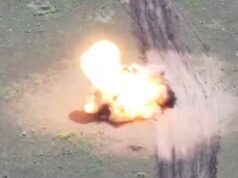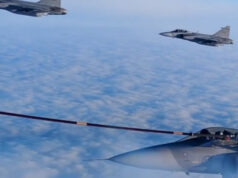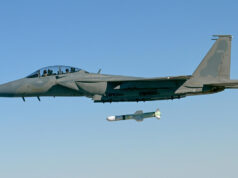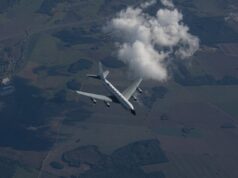During a Defence Committee session on the 1,000-day mark of the Ukraine conflict, experts dissected Russia’s ongoing failures on the battlefield while cautioning against the Kremlin’s continued success in information operations.
Air Marshal Edward Stringer (Ret’d) delivered stark insights into the myths surrounding Russian military power and urged a recalibration of the UK’s national security strategy.
Air Marshal Stringer was unequivocal about Russia’s military performance, describing it as “abysmal.†While the conflict has revealed significant weaknesses in Russia’s armed forces, its success lies in convincing Western nations of untapped power reserves.
“Its real triumph in information operations has been suggesting that there are some great hidden depths—that there is a whole Red Army left untapped that could be unleashed and it has these great powers,†he stated.
He criticised the influence of this perception on Western governments and electorates: “We have ourselves been deterred. I do not like this self-deterrence phrase. You are either influenced or not, and we have been influenced.â€
Stringer also highlighted how Russia’s ability to perpetuate this narrative overshadows its glaring military shortcomings. “We should start to question this myth,†he asserted, pointing to its operations in Ukraine and beyond as evidence of a hollowed-out force.
The Air Marshal proposed a systematic reassessment of Russia’s actual capabilities, alongside a shift in how the UK approaches national security. Comparing the current situation to the rise of terrorism two decades ago, he praised the UK’s robust response during that period.
“We responded very well in this country. OSCT, out of the Home Office, pulled together Government Departments. We have a very robust way of countering international and national terrorism. We need to do the same now.â€
He warned that critical national infrastructure remains vulnerable to cyberattacks, urging a coordinated, cross-government approach to prevent catastrophic disruptions. “We need to look at what our critical national infrastructure is before cyber-attacks take down our railway system or something like that,†he said.
Stringer pushed the importance of the forthcoming Strategic Defence Review (SDR) as a pivotal moment for the UK to reassess its priorities.
“It is a strategic defence review, not a defence and security review. It will be interesting to see the boundaries of that, where their thoughts are, and how they might get us back into where we were when we used to think about the great power threat being the real national security threat,†he explained.
He called for a return to preparedness reminiscent of Cold War-era mobilisation. “We used to produce the war book, have alert measures and be able to mobilise the country in its own defence. We have to get back into that way of thinking,†he said, describing the current moment as a “clear and present danger.â€













Hate to say it but it’s very true what the man says ,back to cold war spending would be a good start .
the other one is that when more than one person knows a secret, it isn’t one. take note America
looking at the attrition rates in the Ukraine, I’d imagine that the Russia should not be able to get the better of what NATO can deploy and NATO has the ability to deploy assets FAST. other than numbers, Russia has little but noise and public rhetoric to worry the West I think NATO would manage very short work of a conflict with Russia. drone technology on land,sea, and air is the future of warfare fully autonomous frigates and destroyers? you can laugh now, but it WILL HAPPEN. perhaps sooner than we’d expect. combat capability systems like say like Cetus can be capable even now. although it will be a well guarded secret. a consultant cetus patrolling along the undersea cable s with the ability to fight it out with a real submarine could be a massive force multiplier I’d be interested to know how quickly they can be produced.maybe it’s already happening it makes far more sense than the Proteus plan
6a single vessel might be too slow to cover the vast distancesbit must be made clear that the U.K would consider the tampering of the undersea network to be a warlike act and that we will act accordingly I was disappointed with the Au.k response to the Salisbury poisoning to me it was also a warlike act
one major thing that th Ukraine war haas done ,is to expose the f the the scary russian bear is little more than a paper Tiger. it’s air force has never gained superiority in the air the navy can’t keep it’s ships afloat or defended or defenseand on the ground, it’s army is a shambolic I’ll trained mess. if it wasn’t for the size of it’s nuclear capability, it would be something to laugh at china is an entirely different animal.
Fair comment from AM Stringer. It’s not that long ago we thought that the German military was still a force to be reckoned with, only to find that a certain defence minister had hollowed out the force so much that basically nothing was working.
What he says is very true but with this government increased defence spending is wishful thinking more like defence cuts on the horizon and another smoke and mirrors exercise.
I know they’re not battleships but I wonder how fast they can be churned out.. a sizable amount of them could be a massive force multiplyer. certainly a technology that the U.K should be at the forefront o. ideally to be a genuine alternative to the manned submarine capabilities. cheaper, without doubt faster to produce with opportunities. that can only get better.
It’s well documented that the first casualty of War is truth. Man’s inhumanity to his fellow man is only surpassed by his infinite stupidity.
â¤ï¸âœŒï¸
the other one is that when more than one person knows a secret, it isn’t one. take note America